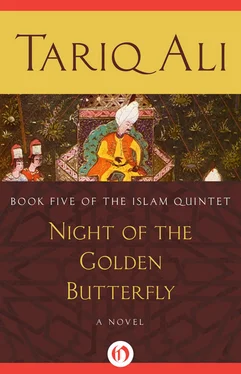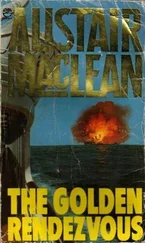His surrender was a mistake, because the Manchu were determined on revenge. They persuaded our generals to disarm, and three days later they assaulted the city. Your father died defending his people. Thousands of innocent Hui were slaughtered. Women and children still alive were given as war booty to the Qing soldiers.
And Li Wan, with her heavenly beauty? Several months before the surrender, she had given birth to a daughter and was pregnant again. She was greatly vexed and even offended when Suleiman insisted she had to leave the city and seek safety elsewhere. She did not want to go, but he insisted and became angry, reminding her of her duty to the higher cause, to their lofty principles and the questions and answers. He said, ‘One day you or your daughter or the child inside you now might be needed to continue the fight for Yunnan.’ Then for the last time he asked her a question from the great work.
‘Why is this place of worship called Clean and Aware?’ She sobbed. ‘When water is clean, fish appear.’
‘What is water? What are fish?’
Tears poured down her cheeks. ‘The True Teaching and Real People.’
‘Never forget that, my dearest woman whom I have loved more than anything in this world.’
Still she resisted the idea of leaving him, and then, finally, much against her own will, she agreed to accompany her parents in a heavily guarded caravan ordered by the Sultan to take them to Cochin China. He promised he would join her there; she knew it would never happen. Fifty soldiers escorted the family to their safe haven, where some of our people were already living. The soldiers, too, had orders not to return.
I made some inquiries in Burma and offered money for any information, but never heard anything about them. Perhaps one day Li Wan’s daughter, or, who knows, her son, will find you, and then you two cousins will have much to discuss.
Qin-shi, memory is the preserve of the victors, but wherever you go, I never want you or your children to forget who we were and what they did to us. They say that the grass grows stronger on plains enriched with blood, but sometimes nothing will grow on that soil.
A QUARTER OF A century had elapsed since I had left Lahore, and then fate placed a painter in my way. Plato re-entered my life in 1988, but in such a unique fashion that at first I didn’t recognize him. A London newspaper rang to ask if I would write about an unusual exhibition of paintings by an unknown Fatherland artist in an obscure East End gallery. The gallery was housed in a former medieval nunnery and only exhibited new work. From first-time sinners to first-time artists, said the woman on the phone to amuse me. The painter’s name, Shah Pervaiz Shah, meant nothing to me, and that in itself was intriguing, since I thought I knew every serious painter in Fatherland. He must be a new young thing, and I wasn’t in the mood. The woman persisted. It was his first exhibition. It would mean a great deal to him if I went, and the painter had wanted me to know that it didn’t matter if I hated the paintings. He never painted to please, and if I chose to ridicule his follies in print that was fine by him. This injunction had the desired effect. I decided to go the following morning, and it was agreed that I would write a piece only if I liked the work. They rang me back and told me that the caretaker would let me in and turn on the lights.
It was a beautiful November morning, cold, crisp and cloudless. I got off at Mile End and walked to the old nunnery. The Bengali caretaker was waiting patiently. He was dressed in a slightly eccentric fashion: a bright red beret covered his head and huge dark glasses concealed most of his face. Perhaps he, too, wanted to be an artist. Neither of us spoke as he unlocked the door and turned on the lights. The place was horribly lit, perhaps in homage to its past, but extremely unfair to the poor painter. To my great irritation, the caretaker hung around in the background, watching me closely as I began to look at the works. They were black and white etchings and they depicted pure agony, which was what the exhibition should have been titled. It took me some time to study each frame. The figures depicted were in different stages of despair. Munch’s Scream multiplied by a hundred.
Some years ago, after giving a lecture in Oslo I dragged a group of newly arrived Punjabi migrants who attended my talk to the Munch museum to show them their new country’s greatest artist. Some were reluctant to waste precious time but came anyway. All of them were stunned, and one, Salah, who became a dear friend, had moist eyes as he whispered in Punjabi, ‘This is an artist who knew inner pain. Our Sufi poets say, that the cure for that lies in oneself. Neither Allah nor a psychiatrist can help.’
I was reminded of that remark now as I studied each etching closely. This painter had experienced more than inner pain. He was bearing witness to a terrible tragedy. Men, women and children stood dying, together in three of the pictures, separately in the others. One showed a child stuck to its mother’s breast. Their eyes were gazing in different directions. Both were dead. After an hour I slumped on a bench. It was not what one expects so soon after breakfast. I looked for a catalogue or the sheet of paper detailing the work and the painter. There was nothing.
The caretaker, whose presence I had by now completely forgotten, muttered in broken Urdu, ‘Upstairs, more. No rush. There are no limits on time.’
Upstairs? I was not sure I could take any more, but as he turned on the lights I staggered up the winding stairs to another space. What had the nuns done here? It was obvious. This had been a primitive chapel, with a tiny confessional in a corner for the mother superior to console her charges in whatever way she considered fit. Nunneries always make me think of the Decameron .
Then I looked at the pictures. Colour! These were not etchings but vibrant paintings: watercolours and a few oils, though miniature in size. As for the subject matter, we had gone from Munch to Grosz, though in reality this artist was like neither. Shah Pervaiz Shah, or SPS, as he signed himself, was an original. I had no doubt on this score. My mood changed and I began to laugh loudly. These were the most savage caricatures of mullahs that I had ever seen. The literary tradition in the Punjab and elsewhere in the Islamic world had, of course, never spared the rod when it came to the mullahs, but this was something new and refreshing. Virtually every painting made me laugh. Here was a mullah walking with his veiled wife, but in his mind’s eye he was seeing naked houris with huge breasts. Another bearded venerable was holding an erect friend in his hand as he enviously watched two young men pleasuring each other. I roared with delight. I wanted to meet SPS or whatever his real name might be, since it was obvious now that he painted under a pseudonym, and who could blame him? I would do more than just write about it. I would get his work filmed and shown on television.
The caretaker had been following me as I studied each of these masterpieces, but I hadn’t noticed him. As he saw me laughing at a sketch of a mullah absentmindedly stroking his penis while he gazed longingly at the forbidden apple on the celestial tree, he addressed me in Punjabi.
‘Like them?’
‘They’re brilliant. Do you know the artist?’
‘I am the artist. Don’t you recognize me?’
He took off his stupid beret and dark glasses. Even then I had some difficulty, since he was bald as a turnip. Then I realized.
‘Plato? Can it be?’
‘So now you don’t recognize me.’
We embraced each other. My failure to recognize him was an even bigger shock than his actual presence. It worried me. The only explanation was that I had not looked too closely at the caretaker unlocking the gallery and later it was the paintings that had demanded all my attention. I apologized profusely but he was triumphant.
Читать дальше












